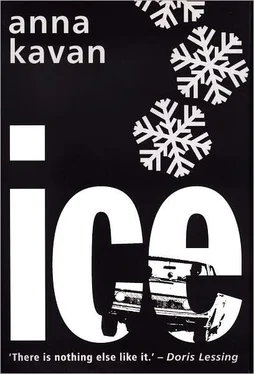Despairingly she looked all round. She was completely encircled by the tremendous ice walls, which were made fluid by explosions of blinding light, so that they moved and changed with a continuous liquid motion, advancing in torrents of ice, avalanches as big as oceans, flooding everywhere over the doomed world. Wherever she looked, she saw the same fearful encirclement, soaring battlements of ice, an overhanging ring of frigid, fiery, colossal waves about to collapse upon her. Frozen by the deathly cold emanating from the ice, dazzled by the blaze of crystalline ice-light, she felt herself becoming part of the polar vision, her structure becoming one with the structure of ice and snow. As her fate, she accepted the world of ice, shining, shimmering, dead; she resigned herself to the triumph of glaciers and the death of her world.
It was essential for me to find her without delay. The situation was alarming, the atmosphere tense, the emergency imminent. There was talk of a secret act of aggression by some foreign power, but no one knew what had actually happened. The government would not disclose the facts. I was informed privately of a steep rise in radioactive pollution, pointing to the explosion of a nuclear device, but of an unknown type, the consequences of which could not be accurately predicted. It was possible that polar modifications had resulted, and would lead to a substantial climatic change due to the refraction of solar heat. If the melting antarctic ice cap flowed over the South Pacific and Alantic oceans, a vast ice-mass would be created, reflecting the sun’s rays and throwing them back into outer space, thus depriving the earth of warmth. In town, everything was chaotic and contradictory. News from abroad was censored, but travel was left unrestricted. Confusion was increased by a spate of new and conflicting regulations, and by the arbitrary way controls were imposed or lifted. The one thing that would have clarified the position was an over-all picture of world events; but this was prohibited by the determination of the politicians to ban all foreign news. My impression was that they had lost their heads, did not know how to deal with the approaching danger, and hoped to keep the public in ignorance of its exact nature until a plan had been evolved.
No doubt people would have been more concerned, and would have made greater efforts to find out what was taking place in other countries, if, at home, they had not been obliged to contend with the fuel shortage, the power cuts, the breakdown of transport, and the rapid diversion of supplies to the black market.
There was no sign of a break in the abnormal cold. My room was reasonably warm, but even in hotels heating was being reduced to a minimum, and, outside, the erratic, restricted services hampered my investigations. The river had been frozen over for weeks, the total paralysis of the docks was a serious problem. All essential commodities were in short supply; rationing, at least of fuel and food, could not be delayed much longer, despite the reluctance of those in power to resort to unpopular measures.
Everyone who could do so was leaving in search of better conditions. No more passages were available, either by sea or air; there were long waiting lists for all ships and planes. I had no proof that the girl was already abroad. On the whole it seemed unlikely she would have managed to leave the country, and an obscure train of thought suggested that she might embark on a certain vessel.
The port was a long way off, to reach it involved a long complicated journey. I was delayed, got there, after travelling all night, only an hour before sailing time. The passengers were already aboard, crowding the decks with friends who were seeing them off. The first thing I had to do was to speak to the captain. He turned out to be maddeningly talkative. While I became more and more impatient, he complained at great length about the way the authorities allowed overcrowding: it was a danger to his ship, unfair to himself, to the company, the passengers, the insurance people. That was his business. As soon as I got permission to get on with my own, I made a methodical search of the ship, but without finding a trace of the person I wanted.
Finally I gave up in despair and went out on deck. Too tired and disheartened to push through the crowds of people milling about there, I stood by the rail, overcome by a sudden urge to abandon the whole affair. I had never really had a valid reason for supposing the girl would be on this ship. Suddenly it seemed neither sensible, nor even sane, to continue a search based solely on vague surmise; particularly as my attitude to its object was so undefined. When I considered that imperative need I felt for her, as for a missing part of myself, it appeared less like love than an inexplicable aberration, the sign of some character-flaw I ought to eradicate, instead of letting it dominate me.
At this moment a big black-backed gull sailed past, almost brushing my cheek with its wing tip, as if on purpose to draw my attention and eyes after it up to the boat deck. At once I saw her there, looking away from me, where no one had been before; and everything I had just been thinking was swept out of my head by a wave of excitement, my old craving for her returned. I was convinced it was she without even seeing her face; no other girl in the world had such dazzling hair, or was so thin that her fragility could be seen through a thick grey coat. I simply had to reach her, it was all I could think of. Envying the gull’s effortless flight, I plunged straight into the solid mass of humanity separating me from her, and forced my way through. I had hardly any time, in a moment the boat would be sailing. Visitors were leaving already, forming a strong cross current I had to fight. My one idea was to get to the boatdeck before it was too late. In my anxiety, I must have pushed people aside. Hostile remarks were made, a fist shaken. I tried to explain my urgency to those who obstructed me, but they would not listen. Three tough looking young men linked arms and aggressively barred my way, their expressions threatening. I had not meant to offend, hardly knew what I was doing. I was thinking only of her. Suddenly an official voice shouted through a loud speaker: ‘All visitors ashore! The gangway will be raised in exactly two minutes.’ The ship’s siren sounded an earsplitting blast. An immediate rush followed. It was quite impossible to resist the human flood surging towards the gangway. I was caught up in the stampede, dragged along with it, off the boat, and on to the quay.
Standing at the water’s edge, I soon saw her high above me, considerably further off now. The ship had already moved away from the shore and was gathering speed every second, already divided from me by a strip of water too wide to jump. In desperation, I shouted and waved my arms, trying to attract her attention. It was hopeless. A whole sea of arms waved all round me, innumerable voices were shouting unintelligibly. I saw her turn to speak to somebody who had just joined her, at the same time pulling a hood over her head, so that her hair was hidden. Immediate doubts invaded me, and increased as I watched her. After all, perhaps she was not the right girl; she seemed too self-possessed. But I was not certain.
The boat was now beginning the turn that would bring it round facing the mouth of the harbour, leaving behind it a curving track of smoother water, like the swath left by a scythe. I stood staring after it, although cold had driven the passengers off the decks and there was no more hope of recognition. I dimly remembered what I had been thinking just before I caught sight of her, but only as one might recall an incident from a dream. Once again the urgency of the search had reclaimed me; I was totally absorbed in that obsessional need, as for a lost, essential portion of my own being. Everything else in the world seemed immaterial.
Читать дальше












